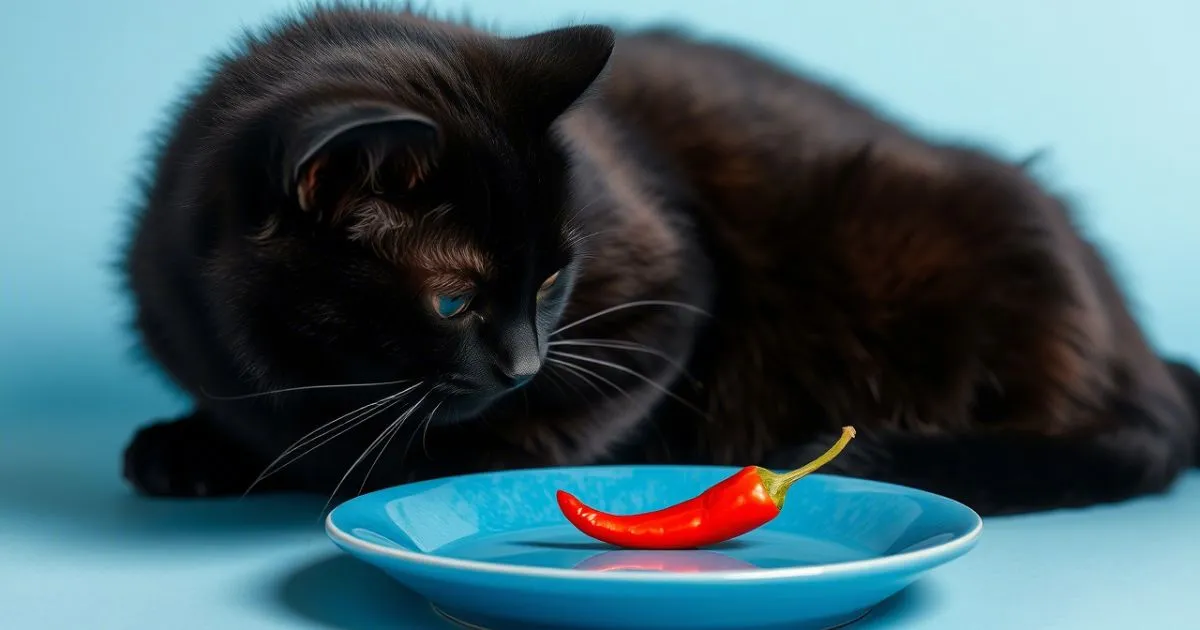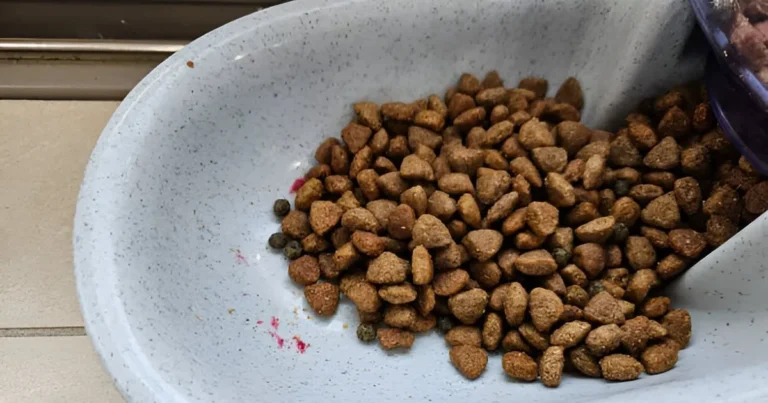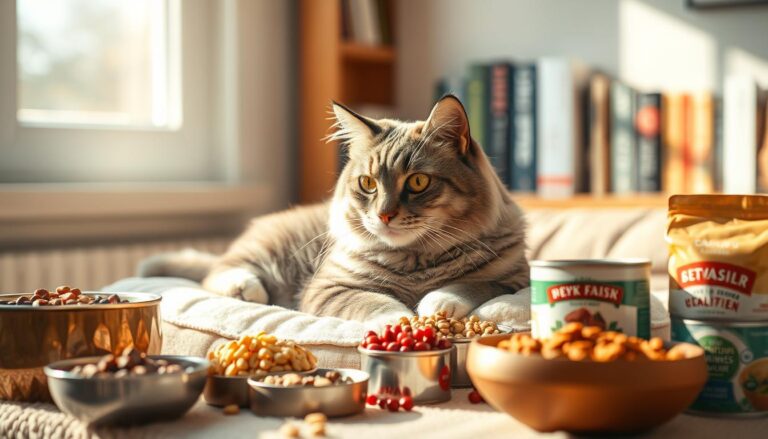Can Cats Taste Spicy Food? Understanding Feline Taste Buds and Sensitivity
Table of Contents
Can Cats Taste Spicy Food?
Ever thought about how your cat handles spicy food? Cats see the world of taste very differently from us. Their take on spicy food is both complex and fascinating, offering deep insights into their taste tolerance.
Humans enjoy a broad spectrum of flavors, but cats taste things in a unique way. Their ability to handle spicy food goes beyond just taste. It involves complex biological processes that keep them safe from harmful substances. Their taste buds are specialized for survival and meeting their nutritional needs.
To understand cats and spicy food, we must look at their unique senses. Each cat reacts differently, making their food experiences intriguing for pet owners. It helps us grasp their dietary preferences better.
Key Takeaways
- Cats have significantly different taste receptors compared to humans
- Spicy foods are not naturally part of a cat’s diet
- Feline taste perception is more about survival than enjoyment
- Cats lack specific taste receptors for detecting spiciness
- Individual cats may react differently to spicy substances
The Anatomy of Feline Taste Buds and Their Unique Features
Cats have a special taste system that’s different from ours. Knowing how they taste things can help us understand their food choices. This is especially true for spicy cat treats.
Cats have about 470 taste buds, which is fewer than humans’ 9,000. But, this doesn’t mean they can’t taste well. They use other senses to enjoy their food.
How Cat Taste Receptors Differ from Humans
Cats have taste receptors that are unique. Their taste buds are made to detect:
- Proteins and amino acids
- Specific meat-based flavors
- Limited sweet taste sensations
Cats can’t taste spicy food like we do. Their taste buds focus on finding protein in their food.
The Role of Smell in Feline Taste Perception
A cat’s sense of smell is key to their taste. They have about 200 million cells for smelling, compared to our 5 million. Cats use smell to judge food quality.
Interesting fact: A cat’s sense of smell is closely tied to their taste. This is why they might prefer foods with strong smells over spicy ones.
Understanding Taste Bud Distribution in Cats
Cats have taste buds in different places than humans. Most of theirs are on the tongue’s surface. But, they’re more focused in certain areas to quickly check food’s quality.
This special setup helps cats choose the right food fast. It makes sure they get what they need to stay healthy.
Can Cats Taste Spicy Food and Process Heat Sensations?
Understanding how cats taste spicy food is quite interesting. Cats see the world differently than humans do. Their taste system is unique and not like ours.
Cats can taste several flavors, including:
- Sour flavors
- Bitter tastes
- Salty sensations
- Umami flavors
Cats can’t taste spiciness like we do. They don’t have special receptors for capsaicin. Their taste is more about proteins and meats.
Feline taste buds are designed primarily for survival and nutritional needs. Cats might not like spicy food because of the heat, not the taste. They react to the heat and might feel uncomfortable.
Cats are more sensitive to the heat of spicy food than to the taste. The trigeminal nerve, which senses temperature and irritation, is what makes them uncomfortable. This is why cats might not like spicy food.
How Cats React to Spicy Foods and Capsaicin
Cats can have a strong reaction to spicy food, which can be dangerous. They are very sensitive to spicy substances because of their unique senses. It’s important to know how your cat reacts to capsaicin and other spicy ingredients for their health.
Physical Responses to Spicy Substances
Cats show several physical signs when they face spicy foods:
- Excessive drooling or salivation
- Pawing at the mouth or face
- Intense gastrointestinal discomfort
- Visible signs of distress
Behavioral Changes When Encountering Spicy Foods
Your cat’s behavior can tell you a lot about their experience with spicy food. They usually show clear signs of not wanting to be near spicy things.
| Behavioral Reaction | Potential Cause |
|---|---|
| Sudden withdrawal | Intense burning sensation |
| Agitation or restlessness | Digestive irritation |
| Refusal to eat | Overwhelming spice sensation |
Warning Signs of Spice Sensitivity
Knowing the early signs of spice sensitivity can help keep your cat safe. Get your cat to the vet right away if you see severe reactions.
- Persistent vomiting
- Significant changes in eating habits
- Visible signs of pain or distress
- Unexplained lethargy
Cats can’t safely eat spicy foods because of their sensitive digestive systems and taste receptors. Always think about what’s best for your cat’s diet and talk to a vet about it.
The Safety Concerns of Feeding Cats Spicy Foods
Spicy cat treats might seem exciting, but they’re not safe for your feline friend. Cats can’t handle spicy foods like humans do. Their sensitive digestive system and internal organs are at risk.
The main worries about giving cats spicy foods are:
- Severe digestive irritation
- Potential gastrointestinal inflammation
- Risk of painful mouth and throat reactions
- Potential long-term digestive system damage
Cats can’t process spicy compounds like capsaicin. When they eat hot food, they face serious health issues. These can include:
| Symptom | Potential Impact |
|---|---|
| Mouth Irritation | Excessive drooling, pawing at mouth |
| Digestive Distress | Vomiting, diarrhea, stomach pain |
| Respiratory Issues | Coughing, wheezing |
Veterinary experts strongly recommend avoiding spicy cat treats entirely. Your cat’s nutritional needs are best met through balanced, species-appropriate diets designed specifically for feline health.
If your cat accidentally eats spicy food, watch them closely. Call your vet right away if you see any unusual symptoms or signs of distress.
Common Household Spices and Their Effects on Cats
It’s important to know how spices affect your cat’s health. Cats have their own taste preferences, but not all spices are safe. This guide will help you understand which spices are safe for your cat.
Safe vs. Harmful Spices for Felines
Some spices can be very dangerous for cats. You should be very careful with spicy foods for cats. Here are some spices to avoid:
- Garlic and onion powder: Highly toxic to cats
- Nutmeg: Can cause neurological issues
- Chili powder: Potentially harmful to digestive system
- Salt: Dangerous in large quantities
Emergency Steps if Your Cat Consumes Spicy Food
If your cat eats spicy food, act fast:
- Remove the spicy food right away
- Give them fresh water
- Watch for signs like:
- Excessive drooling
- Vomiting
- Diarrhea
- Call your vet if the symptoms don’t go away
Alternative Flavor Options for Cats
Instead of spicy treats, try these safe options:
- Bonito flakes
- Small amounts of cooked chicken
- Nutritional yeast
- Freeze-dried meat treats
Cats like different tastes than humans. What you find tasty might not be good for your cat. Always think about your cat’s health when trying new foods.
Understanding Your Cat’s Natural Food Preferences
Cats are unique carnivores with special taste preferences. Their diet is different from humans. They love protein-rich foods and avoid spicy food.
Cats are drawn to meat flavors and textures. Their taste buds are made for detecting proteins, not spices. They prefer savory tastes that remind them of hunting.
Domestic cats still prefer simple, meat-based proteins. Strong flavors can be overwhelming and harmful. Knowing their natural preferences helps you choose the right food for them.
Understanding cats’ different taste approach helps in choosing their diet. Opt for high-quality proteins and avoid spicy or complex flavors. This keeps your cat happy and healthy.
FAQ
Can cats actually taste spicy food?
No, cats can’t taste spiciness like we do. They don’t have the taste receptors for capsaicin, the heat in spicy foods. They might react to spicy stuff, but it’s not the same as how we taste it.
Why do cats react to spicy foods if they can’t taste them?
Cats react to spicy foods because of their sensitive nervous system. The capsaicin in spicy foods irritates their mouth, throat, and stomach. This can make them paw at their mouth, drool a lot, or try to avoid the food.
Are spicy foods dangerous for cats?
Yes, spicy foods can harm cats. They can cause vomiting, diarrhea, and stomach pain. Some spices might even be toxic to cats, leading to serious health issues.
How many taste buds do cats have compared to humans?
Cats have about 470 taste buds, much fewer than humans’ 9,000. This means they rely more on smell and texture than taste when eating.
What should I do if my cat accidentally eats something spicy?
Keep an eye on your cat for signs of distress. Give them lots of water and watch for drooling, vomiting, or changes in behavior. If they seem really uncomfortable or sick, call your vet right away.
Can cats have any spices at all?
Most spices are not good for cats. Some herbs like catnip are okay, but cooking spices can be irritating or toxic. Always check with your vet before adding new foods or spices to your cat’s diet.
Do cats have a preference for certain flavors?
Cats mostly like meat and prefer savory, umami flavors. They tend to avoid strong, acidic, or bitter tastes. That’s why they don’t like spicy foods.
How do cats experience taste differently from humans?
Cats focus more on smell and protein than taste. They have special receptors for protein-rich foods, fitting their meat-eating nature. Their taste experience is simpler than ours, focusing on nutrition rather than flavor.







